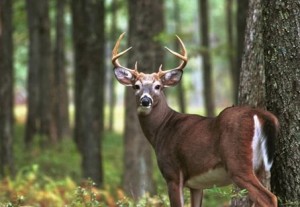Goodbye, America: More Recollections of Deer Seasons Past
 Last week I wrote an article on Deer Season a half century ago, focusing on my grandmother’s town in the mountains of Emporium, Pennsylvania. Each year, my grandmother and other households opened their doors and kitchens and beds to perfect strangers who came to town to shoot a deer—and there were no problems.
Last week I wrote an article on Deer Season a half century ago, focusing on my grandmother’s town in the mountains of Emporium, Pennsylvania. Each year, my grandmother and other households opened their doors and kitchens and beds to perfect strangers who came to town to shoot a deer—and there were no problems.
The piece was about more than Deer Season. It was about America, our culture, and how much this country and its people have changed.
The article really struck a chord, running in publications from the AmmoLand Shooting Sports News to the Las Vegas Review-Journal. Especially interesting were the responses I got, with numerous readers weighing in with their own recollections. I thought it worthwhile to share a few of my favorites here:
From Sugarbare: “Back in the ‘60s, we left our guns in the cars parked at the high school so that we could immediately head for the woods as soon as school was out. Those who drove to school would store guns for those who were dropped off at school…. Yep, hunting season was an event.”
From Buzzard: “When I was in the second grade, I took my dad’s old .38 pistol to school for show-and-tell. Now days they would call in the SWAT team for a kid with an empty shotgun shell. What happened to our country?”
From Vdroddy: “Even in the 1960s and ‘70s, in Clarion County, Pennsylvania, we brought our hunting rifles to school just before Buck Season to show them off.”
From a Grove City College graduate, class of ’67: “I grew up about 20 miles from Emporium, Pennsylvania. You’ve described this area perfectly. What struck me about your article was the general trustworthiness—trusting [armed] people coming into your home. These men just wanted to hunt. When I was a kid, we used to go to the middle of town where there was a weighing station on the first day of Deer Season. We would all gather around to see who got the biggest deer. Everybody was there. We used to take our guns to school. After school, some of the teachers would hunt with us. They would drive deer for us. There was never any problem. Can you imagine that today? Those teachers would be arrested!”
From a faculty colleague: “My grandfather had this hunting cabin…. Twenty guys would stay there. My uncle shot a deer once, brought it back to the camp, got drunk, and passed out. The group left for home the next morning without him. But he had this motorcycle he kept up there—with a sidecar, which was WWII surplus. He was also town sheriff. So he stuffed the deer in the sidecar, head straight up, and drove all the way home. Simple people who had each other and their time together. Makes me happy and sad.”
From Rick from Mount Joy: “Your article really took me back. My grandfather, father, and uncles built a cabin down the road from Emporium in Sinnemahoning in 1947. This is the first year that the cabin stands empty during Deer Season. Time passes but my memories of that area will never fade.”
From an editor in Washington state: “[Your] column really puts into perspective the changes we’ve experienced, from being a country of neighbors we could count on and trust, to the society we live in today where many people don’t even know who their neighbor is across the alley, let alone trust them with anything of value.”
From a “tired” mom: “Okay, Paul, so here’s a sad story: After Hurricane Katrina, my husband went down to the Reliant Center in Houston to help out with all the folks being sheltered there after the levees gave way in New Orleans. I told him, ‘If anybody wants out of there, bring them home with you.’ We live in Ohio. He could not find one person—out of hundreds—who wanted to leave the chaos of the Reliant Center, not even for a few days. (We had the means to fly them to Ohio and then, after that, we’d have flown them anywhere they wanted to go.) And why did nobody want to leave? Because rumors were that the government was going to reissue welfare checks that had been lost in the flood, in addition to providing FEMA handouts. They were willing to stay in a hell-hole in order to get a few bucks from the government, rather than trust in a kind stranger extending a hand. It is a sad world in which we live.”
There’s not much I can add to this.
Yep, America has really changed—sadly, for the worse. This nation and its people and culture will never be the same, and that’s too bad.

